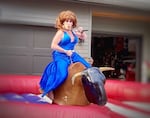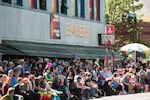Nearly eight months into the coronavirus pandemic, businesses across Oregon continue to struggle. No sector has been harder hit than the state’s bars and restaurants.
In September, the state’s Economic and Revenue Forecast found that revenue for Oregon’s bars and restaurants is down by 56%, and the leisure and hospitality sector as a whole has lost more than 50,000 jobs so far this year.
That has resulted in many iconic local haunts shutting their doors, leaving some folks to bemoan the loss of their favorite sushi spot or neighborhood dive bar.
For Portland’s LQBTQ+ community, it’s just the latest blow in a string of closures to queer-centered spaces.
------------------
As far back as the 1940′s, a small triangle of streets in Southwest Portland was already becoming known as a place to gather for the queer community. Women seeking women made their way to the the Buick Café on 12th and Washington, while gay servicemen home from the war would frequent Rathskeller on SW Taylor Street. Schneiderman’s Music Hall, on SW 10th, had classic vaudeville acts as well as drag performers.
Through the 1960s and ’70s, queer-centered gathering places continued to flourish, despite an attempt by the city, under then-Mayor Terry Schrunk, to shut down six gay bars by trying to pressure the state liquor commission to revoke their licenses.
By the ’80s and ’90s, a stretch of what’s now Harvey Milk Street was home to many LQBTQ+ bars and gathering spots. Smaller in size than San Francisco’s Castro District or New York’s Greenwich Village, the area colloquially nicknamed Pink Triangle, or Vaseline Alley in some circles, had been home to queer-centered spaced for decades.
That’s changed over the last 20 years.
Daniel P. Elliott grew up in Portland, so he’s seen that change first hand.
“It’s very sad because these queer spaces, they’re a home to people,” Elliott said. “People that feel disenfranchised with their own families, or their own [work] life, they could go to the club and actually be who they are without fear of someone looking down on them or ridiculing them. They find a family there.”
Elliott knew he was queer from a young age, but was worried about coming out, fearing backlash from his friends and family. By 18, Elliott was a regular at the City Nightclub, a haven for Portland’s LGBTQ+ youth in the ’80s and ’90s. It closed in 1997.
“It was an all-ages nightclub. And when I got there, there was 14- and 15- and 16- year old kids there dancing, and they were out and they were proud,” Elliott said. “And I was like, ‘Wow, these are the leaders of my community.’ I found people that were like me.”
Elliott was a theater kid and grew up playing the trumpet, so when he saw the performers at the City Nightclub, he knew he wanted to be a part of it.
“I was like, 'Wow, they’re combining their talents and their makeup and their queerdom. [They were] making people smile and laugh and feel comfortable in their own skin,” he said. “So, I started doing drag, and that’s where Bolivia Carmichaels was born.”

Daniel P. Elliott, performing as Bolivia Carmichaels in 2020.
Courtesy Heath Baker
Since 1995, his drag persona Bolivia Carmichaels has been entertaining Portlanders at the Embers Avenue, Darcelle XV & Co., and C.C. Slaughters. Today, only one of those venues still exists. After 48 years, the Embers Avenue closed its doors in 2017. This fall, CC Slaughters shuttered after 39 years.
“We used to have Boxxes, the Brig and Panorama complex. We had Scandals up there. Silverado, the Eagle. That whole street was was our quote-unquote gay district or whatnot. And as those places closed down or moved, we lost a bit of our community feel,” Elliott said. “We could walk down the street and and and hold hands and be in drag and, you know, nobody blinked.”

CC Slaughters, pictured on Nov. 5, 2020, a long-time gay nightclub in Portland, closed its doors in October 2020, after 39 years of business.
Kristyna Wentz-Graff / OPB
“I thought everyone was queer,” said Dr. Bevyn Rowland, who grew up in Portland and also frequented the City Nightclub as a teenager. "I crushed on a lot of cis-males, and so I think I just passed. So I didn’t experience any bullying or self-rejection until my queerness was much more visible to everyone based on who I was in relationship with and falling in love with.
“For me, queer spaces were important, but they were not a matter of survival like they were for a lot of people. A lot of people who lived outside and kids who lived on the street, those were the places that they could go and be safe and have community. It was fundamental to social and physical survival in a lot of ways.”
Rowland said the link to a physical space continued to be important to her as she got older.
“I think there’s something about our generation. It’s a cohort effect, I think, where the brick and mortar and like having a consistent place to go because that’s how our institutions always have been. I think a physical space was so much more salient for us, and that’s the loss I’m experiencing right now as these beautiful places continue to leave Portland.”
Rowland is now a licensed clinical psychologist in Clark County, Washington. She says among her many of her younger LBGTQ+ clients, there’s less of an attachment to a physical, queer-centered space.
“They’re more accustomed to rotating dance floors — like it’ll be at this location one week, and then the next month it will be a different place.”
And, she said, she can get behind the “pop-up” concept, as long as people are still able to have their community. However:
“Being a psychologist and a human being on the planet for 44 years, something really phenomenal happens in-person,” Rowland said. “And in terms of understanding each other, energy exchange, having to be flexible with who we are and how we accept other people, doing that in physical space is different. And if you have dedicated spaces for that, it actually opens up possibilities.”

People line the streets outside the Embers Avenue club at Pride in Portland, Ore., June 19, 2016. The club is now closed.
Bryan M. Vance / OPB
The loss of queer-centered spaces in Portland is part-gentrification, part-digitization the dating world and part-cultural shift in the younger LBGTQ+ community.
Take 26-year-old Thayer Swanson. He also had his first experience of a queer-centered space a decade ago at an all-ages nightclub called the Escape. Opened by a former City Nightclub DJ, the Escape closed at the end of 2016, after 14 years in Portland.
Swanson said, even 10 years ago, queer kids still needed a safe place to go.
“The Escape to me was a place to meet other queer people and their friend groups and allies,” he said. “Where you didn’t have to worry about, ‘OK, who’s watching me?’ It was definitely a place that you could safely engage with people and have behaviors that you probably wouldn’t feel comfortable demonstrating, like simply dancing with your partner at a dance.”
Swanson said many young queer people don’t identify with the few spaces left in the Pink Triangle as their own. The area is seen as “old” Portland, both figuratively and literally.
“It’s not a negative thing. It’s just simply for them,” Swanson said. “Those places are representation of their struggle, and their struggle at the time was just creating safe places for their communities and visibility of the gay and lesbian community.”
Swanson pointed out that a lot of iconic downtown Portland bars didn’t necessarily even cater to a diverse queer crowd, but rather, to strictly white, gay, cis-gendered men.
“We definitely realize the cultural significance of the Pink Triangle district downtown,” he said, “but we also need to realize that the queer community shouldn’t just cater to one sub-demographic.”
One way Swanson sees young LBGTQ+ millennials and zoomers changing the scene is with those previously mentioned dance party pop-ups.
“You’re looking at Judy on Duty, Blow Pony, CAKE,” he said. “So you have queer DJs. You have women-positive, body-positive places. And that really represents my generation’s view of queerness, inherently unlabeled [and] intersectional.”
For now, dance parties are mostly digital, dates are socially distanced, and the handful of LGBTQ+ spaces left in Portland are operating with reduced hours, if at all.
Drag queen Bolivia Carmichaels says the strength of the queer community will survive this, as it has survived so many things before.
“We will all come back together and we will all dance together, and we’ll celebrate the birthdays and the milestones of our lives and will hold each other again. We are a resilient people, and we will be OK.”
